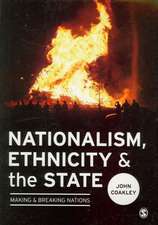Politics of Memory: The Israeli Underground's Struggle for Inclusion in the National Pantheon and Military Commemoralization: Israeli History, Politics and Society
Autor Udi Lebelen Limba Engleză Hardback – 30 noi 2012
A thought provoking study about the dark side of the Israeli nation building era, Politics of Memory explores the politics of historiography, bereavement and military commemoration, and the confrontation over boundaries of national pantheon, examining the effects of these factors on Israeli national identity and politics.
With introductions by Moshe Arens, former Israeli Minister of Defense and Minister for Foreign Affairs, and by Yehiel Kadishai, P.M. Menachem Begin’s chief of staff, this book will be of interest to students and scholars of Israeli history; military studies; memory and heritage studies; the study of loss and bereavement, and politics in general.
| Toate formatele și edițiile | Preț | Express |
|---|---|---|
| Paperback (1) | 388.72 lei 6-8 săpt. | |
| Taylor & Francis – 12 dec 2019 | 388.72 lei 6-8 săpt. | |
| Hardback (1) | 1064.01 lei 6-8 săpt. | |
| Taylor & Francis – 30 noi 2012 | 1064.01 lei 6-8 săpt. |
Din seria Israeli History, Politics and Society
-
 Preț: 348.25 lei
Preț: 348.25 lei -
 Preț: 352.42 lei
Preț: 352.42 lei - 22%
 Preț: 326.96 lei
Preț: 326.96 lei -
 Preț: 416.22 lei
Preț: 416.22 lei -
 Preț: 449.25 lei
Preț: 449.25 lei - 18%
 Preț: 1113.91 lei
Preț: 1113.91 lei - 18%
 Preț: 1332.52 lei
Preț: 1332.52 lei -
 Preț: 416.22 lei
Preț: 416.22 lei - 25%
 Preț: 502.68 lei
Preț: 502.68 lei -
 Preț: 440.77 lei
Preț: 440.77 lei - 25%
 Preț: 824.70 lei
Preț: 824.70 lei - 18%
 Preț: 1002.68 lei
Preț: 1002.68 lei -
 Preț: 436.14 lei
Preț: 436.14 lei - 18%
 Preț: 299.52 lei
Preț: 299.52 lei - 23%
 Preț: 328.81 lei
Preț: 328.81 lei - 24%
 Preț: 324.59 lei
Preț: 324.59 lei -
 Preț: 412.37 lei
Preț: 412.37 lei - 25%
 Preț: 335.49 lei
Preț: 335.49 lei - 18%
 Preț: 1057.13 lei
Preț: 1057.13 lei - 25%
 Preț: 339.76 lei
Preț: 339.76 lei -
 Preț: 473.04 lei
Preț: 473.04 lei -
 Preț: 436.14 lei
Preț: 436.14 lei -
 Preț: 413.33 lei
Preț: 413.33 lei - 28%
 Preț: 215.19 lei
Preț: 215.19 lei -
 Preț: 394.39 lei
Preț: 394.39 lei - 18%
 Preț: 1056.14 lei
Preț: 1056.14 lei - 18%
 Preț: 1056.32 lei
Preț: 1056.32 lei -
 Preț: 436.14 lei
Preț: 436.14 lei - 18%
 Preț: 1065.40 lei
Preț: 1065.40 lei - 18%
 Preț: 1113.16 lei
Preț: 1113.16 lei - 25%
 Preț: 827.23 lei
Preț: 827.23 lei -
 Preț: 455.19 lei
Preț: 455.19 lei -
 Preț: 383.75 lei
Preț: 383.75 lei -
 Preț: 419.54 lei
Preț: 419.54 lei - 27%
 Preț: 144.76 lei
Preț: 144.76 lei - 21%
 Preț: 335.33 lei
Preț: 335.33 lei - 33%
 Preț: 369.42 lei
Preț: 369.42 lei - 30%
 Preț: 848.15 lei
Preț: 848.15 lei
Preț: 1064.01 lei
Preț vechi: 1297.57 lei
-18% Nou
Puncte Express: 1596
Preț estimativ în valută:
203.63€ • 211.80$ • 168.10£
203.63€ • 211.80$ • 168.10£
Carte tipărită la comandă
Livrare economică 12-26 aprilie
Preluare comenzi: 021 569.72.76
Specificații
ISBN-13: 9780415412391
ISBN-10: 0415412390
Pagini: 304
Dimensiuni: 156 x 234 x 24 mm
Greutate: 0.72 kg
Ediția:New.
Editura: Taylor & Francis
Colecția Routledge
Seria Israeli History, Politics and Society
Locul publicării:Oxford, United Kingdom
ISBN-10: 0415412390
Pagini: 304
Dimensiuni: 156 x 234 x 24 mm
Greutate: 0.72 kg
Ediția:New.
Editura: Taylor & Francis
Colecția Routledge
Seria Israeli History, Politics and Society
Locul publicării:Oxford, United Kingdom
Cuprins
Introduction: Politics of Memory, Bereavment and Military Commemoration 1.The Politics of Memory: Theoretical Framework and Basic Concepts 2.The Political Sphere: Building the Infrastructure for Memory Inclusion and Politics Closure of Bereavement 3.Commemorative Landscapes: the Politics of Hegemony in Physical Space 4.The language of sovereignty 5.The Politics of Historiography 6. The Period of Ambivalence (1963-1977): First Steps of Inclusion in National Commemoration and Memory 7. The Electoral Turnabout: Statism in the National Pantheon 8.Conclusion: Boundaries of National Pantheon- Confrontations in the Politics of Israeli Memory
Notă biografică
Udi Lebel is head of the department of Sociology and Anthropology at Ariel University and researcher at the Samaria and Jordan Rift R&D Center, Israel. He is an expert in Civil-Military Relations; Politics of Trauma, Death and Dying; Political Culture of Collective Memory and Bereavement.
Descriere
Providing a new angle on state control and political legitimacy, this book addresses the efforts of successive Israeli governments to establish their political dominance and legitimacy through the selective production and collective assimilation of cultural practices associated with bereavement and commemoration of those who fell on their country's behalf.















